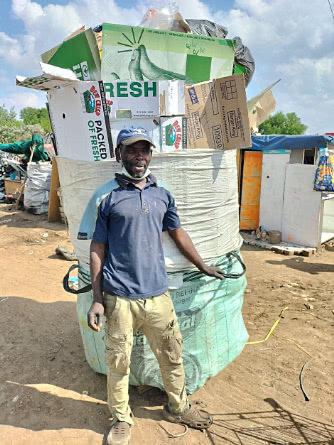A statement of solidarity with the wastepickers in Mushroomville
WIEGO and its affiliates stand in solidarity with the 180 waste pickers in Mushroomville who were given notice of eviction on 15th November 2021 from the area they have lived and worked in for over a decade. The final eviction notice, served by the Gauteng High Court, is a blow to this group of workers who provide a vital service to the city’s waste management system. The court order ruled in favour of the private owner, Turnover Trading 191 Proprietary Ltd, which plans on building a hotel at the site. It failed to consider the right of waste pickers to a secure and dignified livelihood.
This group of waste pickers has faced the constant threat of eviction since 2017 on Mandela day, where the private owner brought in a private security company to remove them from the area they had been living and working in for more than ten years. Since this incident, the waste pickers have been engaging in a 4-year court battle with the support of Lawyers for Human Rights to secure the workers' rights to secure housing and the freedom to pursue their livelihood activities in the area. LHR has gone through several rounds of court proceedings, and the Constitutional Court refused to hear the case last year during the lockdown; it has all come down to the workers losing this legal battle. Throughout this process, the waste pickers in Mushroomville have been engaging with the Department of Environment and Agriculture at the City of Tshwane in a collective negotiation forum, with the support of WIEGO and other NGOs.
We believe the eviction is due to the failure of the City of Tshwane to recognize the contribution of waste pickers in Mushroomville to the formal waste management system, and to guarantee their access to a decent work environment and social protection. It is a clear-cut case of corporate interests being put before the livelihoods of the waste pickers, as the property owner plans to build a hotel in that area. Access to land, housing and the right to work remains a challenge for the working poor across South Africa who live and work in public spaces. In the case of waste pickers, they live close to where they can access high value recyclable materials (usually affluent communities), sort and store their materials safely. Evictions of waste pickers from lands and dumpsites are a continuous struggle nationwide. In many cases, they are the result of a series of intersectional injustices coerced by the capitalist system that dispossess the workers from their means of production and living. The order states that the waste pickers must be relocated to Sunderland Ridge in a matter of a few short days, and the relocation cannot happen until the new site is ready with temporary shelters and basic amenities. The city set 15 Nov 2021 as the date of relocation. We expect resistance from the waste pickers as they are on the verge of losing their materials without sufficient time to sell what they recovered in the past months.
We are requesting from the City of Tshwane to grant Mushroomville waste pickers the ability to continue working both in the city and in the vicinity of the new housing location. In the longer term, we are asking for transparency and City dedication to develop designated spaces within the city that guarantees waste pickers’ access to work and housing.
We are calling for affiliates, partners, and organizations working on rights and justice issues for solidarity with the waste pickers in Mushroomville who are facing the threat of eviction and loss of livelihood.
For more information contact:
Vanessa Pillay – Programme Officer, Organization & Representation at vanessa.pillay@wiego.org or by cell phone on 0832819841.
Stefan van der Westhuizen-Founder – RubiconZA NPO at stefanvdw@rubiconza.co.za or by cell phone on 0822004444.

